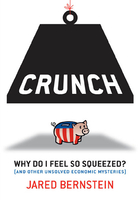
Preface
My name is Jared and I am a practicing economist.
I made my first graph decades ago, and while it sure felt good to see the way the bars lined up, I figured I could control the impulse. After a while, I was making several graphs and tables per hour, and talking earnestly about inflation, supply and demand curves, and Federal Reserve policy. I still thought I could stop whenever I wanted to.
It hasn’t worked out that way. In fact, it’s gotten much worse. I now go on TV shows and have raging arguments about tax cuts, trade balances, the minimum wage, and unemployment. Maybe you’ve seen me while flipping through the channels. Maybe you’ve wondered, whatever’s got this guy so wound up?
I’ll tell you. Economics has been hijacked by the rich and powerful, and it has been forged into a tool that is being used against the rest of us. Far too often, economists justify things many of us know to be wrong while claiming the things we believe are critically important can’t be done.
I can’t tell you how many times I’ve seen smart people with good hearts crumble in the face of economic arguments. Many of us will defer to such arguments, no matter how nuts these arguments seem, because they come shrouded in the mysterious authority of science. You might want to argue that unemployed people need a safety net when they lose their job, for example, but you’re prone to back off the minute some economist points out how that will lead to “European levels of unemployment” or how it will “kill the person’s incentive to find a job.”
Maybe you’ve wondered whether all the tax cuts targeted at wealthy investors are really so necessary, especially given that we’re spending borrowed money, only to be reminded that these tax cuts will spur investment and growth. Don’t you get it? the story goes: We can’t afford not to cut taxes!
At most, you might muster the gumption to say, “Well, I’m not an economist, but that doesn’t sound right to me.”
Well, I am an economist, and if I may ironically borrow a phrase from Ronald Reagan, I’m here to help. It doesn’t sound right to me either, and that’s because it’s wrong.
It doesn’t sound right to me either, and that’s because it’s wrong.
I’m tired of being stuck in the studio engaging in rants with Darth Vaders with PhDs. Wouldn’t it be more useful to have an open-ended, rant-free dialogue with real, everyday people about their economic questions?
Maybe you’ve been wondering, is Social Security really going bust, and what does that mean to me? If I hire an immigrant, am I hurting a native-born worker? How much can presidents affect economic outcomes? What does GDP measure and what does it leave out? How come child care workers make so little? What does the “Fed” do, anyway? What’s the cost of ignoring global warming? What’s a “living wage”? And what is up with all those high-end tax cuts?
And of course, one that looms particularly large in the pages that follow: Why do I feel so squeezed?
In the following pages, I answer these and other questions. Though I sometimes tweaked them a bit, I did not make these questions up, nor did I poll my wonky economist friends. The questions come from non-economists, mostly taken from e-mail questionnaires and the blogo-sphere, where I’ve been having entirely too much fun “talking” about progressive economics and trolling for good questions.
What’s a “good question”? Good question. I’ve got one main criterion. A good question, in the crunchian sense, is one that comes out of your everyday life as you interact with the economy, like the “Why do I feel so squeezed?” example above. Sometimes these quesitons grow out of people’s run-ins with policy matters that leave them perplexed. The other night, for example, when my wife and I were burning far too many brain cells trying to figure out my employer’s new health care plan, she started peppering me with questions about why our health care system is such a mess (jeez, you’d think a guy could catch a break at home . . .). A question might involve a moral dilemma, like the predicament of the woman who wondered if she should worry about the incentives involved in giving a dollar to a homeless person.
And lots of people wanted to learn what to make of key economic statistics, like gross domestic product and unemployment figures. What are they telling us? What’s left out? For example, why, asked a perplexed but observant questioner, does the stock market often rise when the unemployment rate goes up? Seems counterintuitive, no?
Think of this book as a chance to hang out with someone who likes to tackle questions like these and promises to try to answer them in an engaging, non-jargony way. Come on, what do you say? How about it? Hey, where are you going? Get back here! Lemme show you this graph— I’m just getting started!